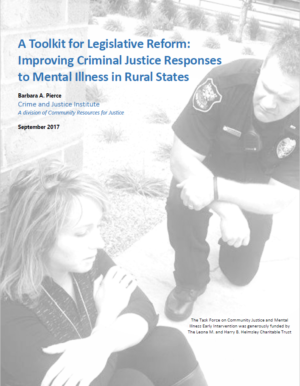
This toolkit, based South Dakota's experience, is designed as a resource for rural states that want to take a statewide, legislative approach to improving criminal justice responses to mental illness.
The Crime and Justice Institute has released a new toolkit for rural states seeking comprehensive, statewide solutions to improve the way their criminal justice systems address individuals who have mental illness.
Nationwide, law enforcement officers and jail staff have become the primary responders to mental health crises, but they often lack the training and resources to do the job well. These challenges are more pronounced in rural areas where mental health care is often largely unavailable in the community and in jails.
According to the Bureau of Justice Statistics, one in four jail inmates in the United States has indicators of serious mental illness compared to one in 19 in the general population.
“Over the past decade, we’ve seen more and more people with mental illness coming into our state’s jails,” said Pennington County South Dakota Sheriff Kevin Thom. “We are lucky here in Rapid City because we have mental health staff and community resources. Our rural jails struggle because they don’t have the space, the staff or the resources needed to care for people.”
A Toolkit for Legislative Reform: Improving Criminal Justice Responses to Mental Illness in Rural States details South Dakota’s successful effort to develop statewide policies to better serve individuals with mental illness who come into contact with the criminal justice system. This effort was catalyzed and supported by the State’s Task Force on Community Justice and Mental Illness Early Intervention, funded by The Leona M. and Harry B. Helmsley Charitable Trust.
Following these efforts, South Dakota lawmakers adopted comprehensive mental health legislation that was signed into law by Gov. Dennis Daugaard in March 2017. The legislative package provides tools and training to law enforcement, jail officers, judges, and other criminal justice professionals; expedites the completion of competency exams, ensuring speedier court processing and shorter jail stays; and strengthens opportunities to divert people from the criminal justice system to mental health treatment.
The toolkit offers a path for comprehensive change, from the decision to pursue statewide reform, launch of the effort, a framework for consensus policy development, and strategies for implementation and sustainability.
“With a rigorous study of how your state criminal justice system responds to mental illness by a multi-disciplinary, bipartisan group and broad stakeholder engagement, it is possible to come up with impactful statewide policies,” said South Dakota State Court Administrator Greg Sattizahn. “The Crime and Justice Institute’s toolkit lays out the steps needed for other states to improve the way they address critical systems issues through legislative action.”
Click here to read the full report.